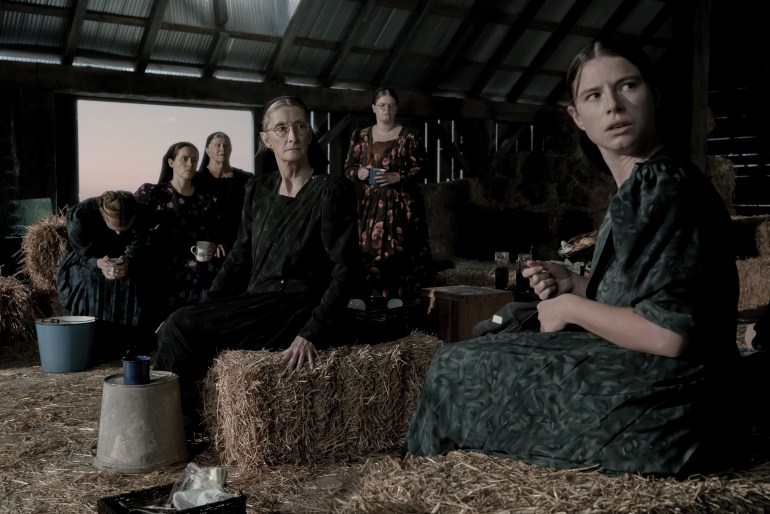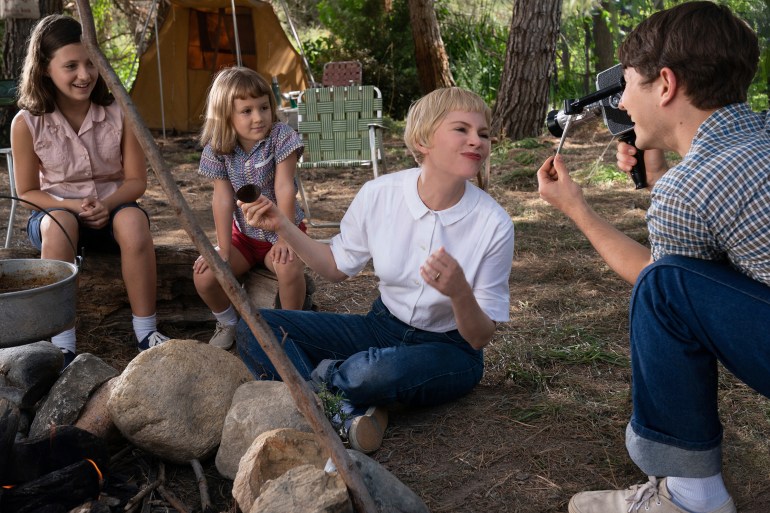But the high point will likely come at the end of Sunday evening, when this year’s best picture is crowned. Ten nominees are looking to walk away with the coveted Oscar for top film — and the field of contenders this year is a varied bunch, ranging from quiet period dramas to punchy summer blockbusters and quirky indie favourites.
Where does each of the films stand in the race for the best picture trophy? Al Jazeera breaks down the strengths and weaknesses that could decide who wins Oscar glory.

Everything Everywhere All at Once
A genre-defying absurdist masterpiece, the film Everything Everywhere All at Once was the dark horse that became a frontrunner in the best picture race.
The film tells the story of Evelyn, an immigrant mother and laundromat owner whose life is falling apart. Not only has she alienated her husband and daughter, but her business threatens to crumble under the scrutiny of the Internal Revenue Service.
But this is no ordinary family drama. As Evelyn’s life starts to fracture, so does the universe, drawing her into a multi-dimensional action comedy that is part martial arts saga, part cinematic homage.
Why it could win: Who doesn’t love an underdog? This indie triumph was nearly universally acclaimed — and gained a cult following despite an off-season release in March 2022.
Why it could lose: Academy voters tend to lean conservative and this film, with its off-kilter comedy, could fall short compared with more traditional offerings.

The Banshees of Inisherin
A dark comedy about friendship, ambition and spiralling hatred, The Banshees of Inisherin reunites filmmaker Martin McDonagh with the odd couple from one of his previous hits, In Bruges: Colin Farrell and Brendan Gleeson.
Once again, their on-screen relationship turns murderous. Farrell plays Pádraic, a farmer whose bland personality starts to grate on Gleeson’s brooding musician Colm.
So Colm makes a drastic pronouncement: Their friendship is over. And if Pádraic attempts to approach him ever again, Colm will cut off his own fingers. Set against the backdrop of the Irish Civil War, McDonagh paints a stark portrait of how even the closest friends can turn into bitter enemies.
Why it could win: The Academy has shown a taste for McDonagh’s mordant humour, with his previous outing — 2017’s Three Billboards Outside Ebbing, Missouri — picking up seven nominations and two wins.
Why it could lose: A quaint allegory set in rural Ireland, this film lacks the pizzazz of some of its competitors and has faced backlash for perpetuating Irish stereotypes.

Elvis
A maestro of grand spectacle, director Baz Luhrmann has long been drawn to the touchstones of Western culture, adapting films based on Shakespeare, opera and the writings of F Scott Fitzgerald.
But for his latest outing, Luhrmann summons one of the biggest hitmakers of the 20th century: the King of Rock and Roll, Elvis Presley.
Blending modern influences with mid-century nostalgia, the biopic Elvis is an unconventional look at the relationship Presley had with his manager Colonel Tom Parker, played by Oscar winner Tom Hanks. But it is newcomer Austin Butler as Elvis who steals the show, with a hip-swinging tour de force.
Why it could win: Biopics are catnip for Oscar voters and pairing a retro soundtrack with Luhrmann’s trademark visual fireworks could be a recipe for success.
Why it could lose: Luhrmann’s adrenaline-infused visual style can read as shallow, and his portrait of Elvis boasts a lot of rhythm and blues — but not much soul.

Tár
She is a conductor at the top of her craft, a veritable celebrity in the world of classical music, with speaking engagements, a book release and a major recording in the works.
But something is haunting the eponymous musician at the heart of the film Tár. And just when her career has reached its heights, a sex scandal will rob her of the thing she craves most: power.
Cate Blanchett delivers a towering performance as Lydia Tár, a woman who has risen in a male-dominated field only to become an abusive force in her own right. Writer-director Todd Field plumbs the depths of Tár’s psyche, delivering a portrait tinged with dread.
Why it could sin: Blanchett is ferocious as the title character and Field’s incisive psychological dramas have netted 14 Oscar nominations so far. A win could finally be in the offing.
Why it could lose: Tár is a film bathed in shadows, brimming with unanswered questions — not your typical crowd-pleaser, in short.

All Quiet on the Western Front
The World War I epic All Quiet on the Western Front heads to the Oscars on a triumphant note: It swept the British Academy Film Awards (BAFTAs) with five wins, including the trophy for best picture.
But the film itself chronicles not triumph but defeat, seen from the mud-caked trenches of 1918 France. That’s where 17-year-old Paul finds himself after enlisting in the German army with his friends.
Paul’s patriotism, however, is soon dampened by the merciless realities of war, in director Edward Berger’s gritty, claustrophobic adaptation of Erich Maria Remarque’s 1929 novel.
Why it could win: From Platoon to The Hurt Locker to The Bridge on the River Kwai, war movies have a history of winning the best picture category — and this one boasts a literary pedigree.
Why it could lose: Of all the best picture nominees this year, this one is the arguably most traditional, which might dissuade Oscar voters looking to distance themselves from the past.

Women Talking
Women Talking is a film as understated as its title — but in the discussion that unfurls lies a depth of pathos and complexity, as a group of Mennonite women confront the horrors of rape.
Based on a 2018 novel that fictionalised real-life events, Women Talking chronicles a community at breaking point. The women have come to realise that nearly all of them have been sexually assaulted in the night, while being kept unconscious with cattle tranquilliser.
Now they have to decide what to do about it. Actor-turned-director Sarah Polley assembles a star-studded cast — headlined by Claire Foy, Rooney Mara, Jessie Buckley and Oscar winner Frances McDormand — to explore the fallout for the isolated religious community.
Why it could win: Women Talking is a poignant look at a timely issue, and its largely female ensemble features some of the top talent in cinema today.
Why it could lose: Some cultural critics warn the momentum behind the #MeToo movement is waning, and other recent films that have explicitly grappled with sexual assault — like the 2022 drama She Said — have been passed over at the Oscars.

The Fabelmans
An institution in US filmmaking, director Steven Spielberg unveils his most intimate project yet with The Fabelmans, a semi-autobiographical portrait of his childhood passion for filmmaking — and his parents’ dissolving marriage.
Gabriel LaBelle stars as Sammy Fabelman, a teenager caught between his engineer father’s practical ambitions and his pianist mother’s stifled artistry.
Inspired by the classic cinema of Cecil B DeMille and John Ford, Sammy picks up a movie camera and embarks on filmmaking endeavours of his own. But the truths he discovers through the eye of the camera lens could fracture his family for good.
Why it could win: Spielberg’s fourth big-screen collaboration with Pulitzer-winning playwright Tony Kushner is a warm-hearted love letter to Hollywood cinema.
Why it could lose: Spielberg’s self-mythologising is gently paced and perhaps a bit too neat, side-stepping some of the heavier emotional stakes that accompany depictions of anti-Semitism and dreams deferred.

Avatar: The Way of Water
Director James Cameron returns to the fictional moon of Pandora for Avatar: The Way of Water, the sequel to his 2009 environmental fantasy.
Set more than 10 years later, the film reunites with Jake Sully, a former US Marine whose consciousness now resides in the body of a Na’vi, one of the moon’s tall blue indigenous inhabitants.
But the Na’vi remain under attack as humans attempt to colonise Pandora and strip its resources. Sully and his family escape to Pandora’s coastline where they embark on a seafaring adventure that owes a nod to Moby Dick — only this time, the whale is the protagonist.
Why it could win: Cameron has long embraced cutting-edge technology, and his latest Avatar employs underwater motion-capture animation that lends crisp beauty to the film’s aquatic scenes.
Why it could lose: Though it was the top-grossing film worldwide, the latest Avatar suffers from symptoms common to many blockbusters: It is long, bloated with action sequences and heavy-handed in its depiction of bad guys versus mystical indigenous protagonists.

Triangle of Sadness
Winner of the prestigious Palme d’Or at the 2022 Cannes Film Festival, Triangle of Sadness is a satire and castaway movie rolled into one.
Writer-director Ruben Östlund rallies a cast of nouveau-riche characters to board the film’s doomed yacht. Among the guest list are a pair of models-turned-influencers, an arms-dealing couple, a Russian oligarch and even a tech magnate.
But their world of easy pleasures gets upended when a string of disasters strikes the ship, capsizing the hierarchy they long enjoyed.
Why it could win: Triangle of Sadness packs the same satirical punch that made the 2019 South Korean film Parasite a best picture winner, sharing its affinity for class commentary, dark humour and overflowing toilets.
Why it could lose: Despite its big win at Cannes, Triangle of Sadness earned mixed reviews, with some critics denouncing its lack of nuance and intellectual posturing.

Top Gun: Maverick
An unapologetic throwback to the era of big 1980s action movies, Top Gun: Maverick soared into theatres in May 2022, just in time for the summer blockbuster season, and it came away as the top earner at the US box office last year.
The engine, of course, behind the high-flying film is Tom Cruise, who at age 60 remains a silver-screen draw.
In this sequel to 1986’s Top Gun, Cruise returns as Pete “Maverick” Mitchell, a daredevil pilot whose disdain for authority has scuttled his military career. But new opportunities — and new challenges — emerge when Maverick is put in charge of training the next generation of fighter pilots.
Why it could win: Top Gun: Maverick is the quintessential popcorn film, a breathless, stunt-filled extravaganza that resonates with a broad American audience.
Why it could lose: Broad, splashy blockbusters rarely take home the Academy’s top honour, and Top Gun: Maverick might not play well with audiences sceptical of its military-themed nostalgia.
